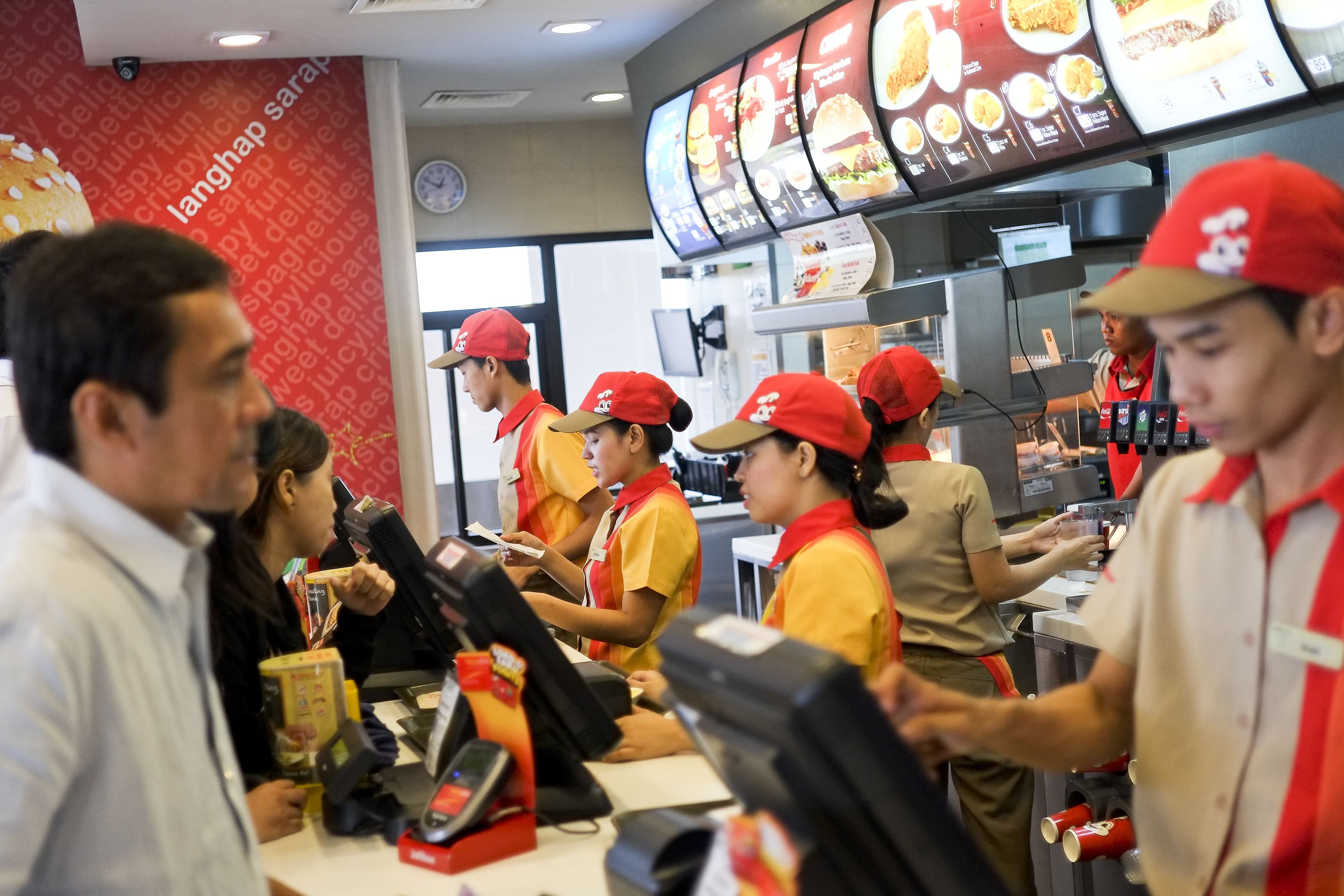
In business, there's nothing like a little healthy competition to keep you motivated.
Only, for brothers Tony Tan Caktiong and Ernesto Tanmantiong, that healthy competition came early on — in the sizable form of fast food icon McDonald's.
It was then 1981 and the brothers were just setting out on the ambitious dream of creating a fast food empire in their native Philippines when McDonald's arrived in town and threatened to consume the market with its vast appetite for international expansion.
Jollibee had already grown substantially from what started in 1975 as an ice cream parlor in Quezon City, just outside of the capital Manila. But, with just a couple dozen fast food outlets scattered across the fractured archipelago, it was a small fry next to McDonald's thousands of branches in the U.S. and international markets.
Tony Tan Caktiong, chairman of Jollibee Foods Corp., speaks during the Hong Kong Asian Financial Forum (AFF) in Hong Kong, China, on Monday, Jan. 19, 2015.
Bloomberg | Getty Images
Indeed, friends told the pair as much, and advised them to retreat from the challenge, Tanmantiong revealed in a recent episode of CNBC's "Managing Asia."
"When we learned that McDonald's was coming into the country, friends were telling us to shy away from the competition — do (like) other businesses and to not try confronting the global giant," Tanmantiong, Jollibee's president and CEO, told CNBC's Christine Tan.
But Tan Caktiong refused to hear it, Tanmantiong explained. Instead, the then-28-year-old founder called the business together to form a plan of attack.
We did a SWOT analysis on our strengths, our weaknesses and what the gaps were.
Ernesto Tanmantiong
CEO and president, Jollibee
"What we did was to have a strategic planning internally," said Tanmantiong.
"We did a SWOT analysis on our strengths, our weaknesses and what the gaps were," he continued, referring to a common analysis technique which aims to assess a business' strengths, weaknesses, opportunities and threats.
While McDonald's benefited from economies of scale and decades' more experience, Tanmantiong said they identified one major area in which the U.S. giant could not compete: Taste. Filipinos tend to favor sweeter and spicier flavors, he said, and it would be difficult for McDonald's to adapt to that without hurting the iconic American taste for which they had become famed.
"After that strategic session, we came out quite confident. So instead of chickening out, we jokingly said, we actually serve Chickenjoy," Tanmantiong said, referring to the company's core fried chicken dish.
It's that unique menu — which includes a sweet "Jolly Spaghetti," hot dogs and spicy burgers — that has fueled the now expanded Jollibee Foods' vast international growth in the years since. The company now has more than 3,500 stores in the Philippines and another 1,000 internationally, including under its additional brands like Smashburger, Burger King Philippines and Panda Express Philippines.
But as the business embarks on further expansion into the U.S., one of its key strategic markets next to China, it will again come head to head with McDonald's — this time on the American rival's home turf. Earlier this year, Jollibee launched its first branch in Manhattan, New York, one of currently just 37 outlets in the U.S.
Ernesto Tanmantiong, CEO of Jollibee Foods Corp., speaks during a Bloomberg Television interview at the Asia-Pacific Economic Cooperation (APEC) CEO Summit.
Bloomberg | Getty Images
Tanmantiong said he, Tan Caktiong (now Jollibee chairman), their two other brothers and the rest of the team, initially planned to embark on that path by by targeting Filipino customers living overseas. But, in fact, he said, they've been surprised to find Jollibee's distinct taste has a home among non-native patrons, too. Indeed, they account for 50 percent of the company's overseas customer base.
That should help Tan Caktiong on his latest mission to turn Jollibee into one of the world's top five restaurant companies in terms of market capitalization. Having become the largest restaurant in Asia in 2014, Jollibee will have to face off against the likes of Starbucks, Yum! Brands and Domino's to secure that accolade.
Tanmantiong said, however, that his brother loves a challenge.
"Tony is a visionary and he loves to dream big," Tanmantiong said. "That's primarily the reason why (Jollibee Foods Corporation) is where it is today. Because of that bold vision, the entire organization has been challenged, but it has been fulfilling trying to achieve the vision."
Don't miss: How these women went from earning 20 cents a day to sending their children to college
Like this story? Subscribe to CNBC Make It on YouTube!
Employees serve customers inside a Jollibee Foods Corp. restaurant in Quezon City, Metro Manila, the Philippines.
Bloomberg | Getty Images
No comments:
Post a Comment